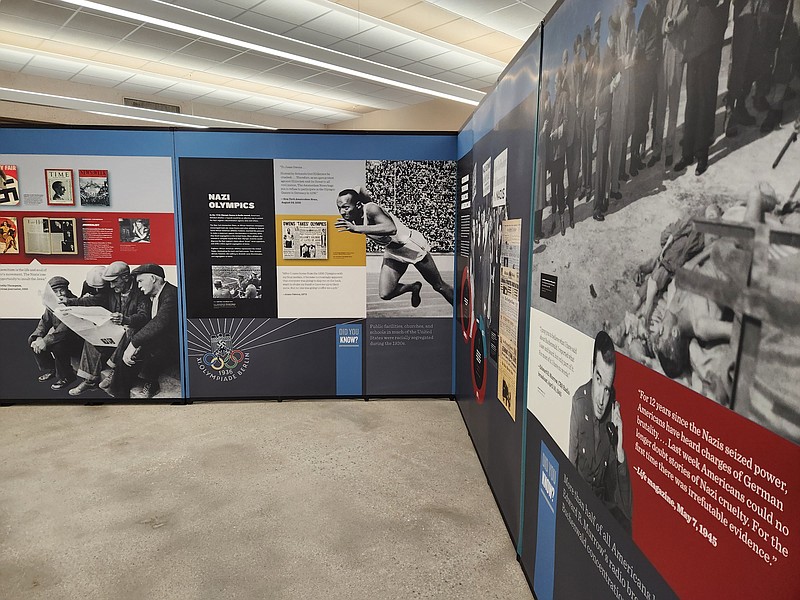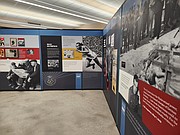For a pedestrian strolling through Vienna, Berlin or one of many other European cities, reminders of the Holocaust turn up unexpectedly, often in the form of brass plaques placed in the pavement in front of nondescript apartments and homes.
The "stumbling stones" record the names of those who once lived there -- and when, precisely, they were forced from their homes and sent to die.
Many Chattanoogans will never get to visit these places or see the traces of the extermination camps where millions of Jews and others on Europe's social margins were systematically killed at the hands of the Nazi regime.
A new exhibit launching Friday -- International Holocaust Remembrance Day -- at the Chattanooga Public Library seeks to surface these memories and highlight how Americans responded, or didn't, as across the Atlantic Ocean, antisemitic persecution, brutal war and the Holocaust took place.
The exhibit, originally produced by the U.S. Holocaust Memorial Museum in Washington, D.C., is among the most extensive the library has ever put on, Christina Sacco, public relations coordinator at the library, said at a launch event for the exhibit on Thursday evening.
It will be in town -- free to visitors -- until Feb. 27 and will be accompanied by several events in the community.
Hundreds gathered at the launch event at the downtown library Thursday evening, including a "who's who" from the Chattanooga Jewish community. The evening started off with an initial open look at the exhibit and snacks on the second floor, courtesy of EP Catering Co. Rabbis Sam Rotenberg and Shaul Perlstein could be seen chatting by the tuna tartare.
Library and city officials spoke at the ensuing presentation. Chattanooga Mayor Tim Kelly reflected on the special role leaders have to keep communities' hatred at bay and the speed with which a democratic Germany turned to the Nazis. Michael Dzik, executive director of the Jewish Federation of Greater Chattanooga, reminded the audience that the largest group of people during the Holocaust were bystanders.
The library exhibit draws on newspaper archives, public opinion polls and popular media to show how Americans perceived and responded to the Holocaust in real time.
Though the American press ran extensive coverage of Hitler's Nazi Germany in the lead-up to war, there was no way readers could have imagined or foreseen the scale of the Nazi mass killings that would take place in the ensuing years as part of what the Nazis called the "final solution," the exhibit said.
Still, it shows how, as dark rumors emerged, immigration restrictions and anti-immigrant sentiment kept many Jews fleeing Europe from entering the U.S.
U.S. immigration authorities did not distinguish between refugees and regular immigrants, the exhibit said: Fleeing Jews, often stripped of all they had by the Nazis, had to fill out extensive documentation and prove they would not become an economic burden, the exhibit said.
The Chattanooga Times ran a story in 1938 from The Associated Press about Nazi attacks on Jewish sympathizers: "These creatures, these friends of Jews, these servants of Jews, deserve no other treatment than that accorded Jews themselves," it quoted a German newspaper as saying.
That same month, a public opinion poll asked Americans how they felt about Jewish immigration. "Should we allow a larger number of Jewish exiles from Germany to come to the United States to live?" it asked, and 71% of respondents said "no."
By the next year, more than 300,000 Germans remained on the waiting list for U.S immigration visas. Most were Jews.
The exhibit tracks World War II -- the Nazi annexation of neighboring countries like Austria, the invasion of Poland -- through domestic American eyes.
In 1941, the final solution was under way, but news of the Nazi plans took months to reach the American public. Skeptics abounded. Some like aviator Charles Lindbergh of the America First Committee accused Jews of being war agitators.
Pearl Harbor shocked the U.S. into war, but in the following years rumors of the mass killing underway, often far from the front lines, remained murky to some.
"It is said that 2 million Jews have been killed in Europe since the war began," said another U.S. public opinion poll in early 1943, soon after the Nazis opened several killing centers in occupied Poland. "Do you think this is true or just a rumor?"
Forty-eight percent of respondents said this was true. The rest called it a rumor, or said they didn't know.
"Bringing something like this exhibit to Chattanooga is extraordinary," Tennessee Holocaust Commission member Alison Lebovitz said by phone Wednesday.
The exhibit, she said, brings a visceral reminder of the Holocaust to people who may otherwise never have been able to visit other prominent memorial sites.
"It's a testament to our public library and community wanting to understand and embrace a part of our collective history that is critical to understand and uncomfortable to learn about," she said.
The library applied for the exhibit, which was targeted toward smaller communities, via the American Library Association, Sacco said. Initially delayed by the pandemic, a small set of exhibits are simultaneously touring the country, Sacco said. The specific one on display in Chattanooga was in Juneau, Alaska, just before.
It is co-produced by several groups, including the Jewish Federation of Greater Chattanooga and the Tennessee Holocaust Commission, and throughout the next month several events will take place around town to supplement the exhibit.
On Feb. 2, several historians will speak on the matter at Chattanooga Public Library.
On Feb. 6, Whitwell Middle School students are going to present on the Paper Clips Project, a longstanding effort by the school to create a monument for Holocaust victims.
Later in the month, a survivor of Auschwitz -- the most notorious of the Nazi death camps, where an estimated million people were killed -- will speak at the Chattanooga Convention Center.
Contact Andrew Schwartz at aschwartz@timesfreepress.com or 423-757-6431.

